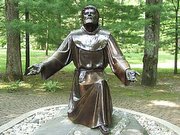Anger into peace

Look downwards towards the Rivo Torto. Tradition has it that the stable which served as a shelter for Francis and his early followers actually stood on land that belonged to his father, so Pietro Bernadone knew that he still provided a home for his son, even if they were no longer on speaking terms. He did not drive him from the land. A poor man and a donkey did that. Pietro remained a father even if, when they met in the streets of Assisi, he could only curse Francis and curse the day when, in front of the bishop, the mayor and the curious townsfolk, his son declared, “Henceforth I will no longer call Pietro Bernadone my father. I have only one Father, and that is God.”
Pietro would neither forgive nor forget that day. Perhaps he was justified. In deciding to reject everything that his parents had planned for him, Francis had been thoughtless and cruel. He made little effort to explain his conversion and his vocation to rebuild the Church. Pietro and Pica were justified in feeling ashamed as their son, of whom they had been so enormously proud, changed his fine clothes for a robe of rough sacking and walked the streets begging for food and for stones to rebuild the ruined church of San Damiano. They would have done anything for Francis, but he shattered their dreams. Did he apologise? We do not know.
In a town as small as Assisi, it was inevitable that Francis, Pietro and Pica would see each other and would hear of each other’s activities. Pica would have been torn apart by her love for her husband and her son. To whom should she be sympathetic? What could she say or do to heal the rift? Pica was both a wife and a mother. How could she act in this situation?
What would have happened if Pietro, instead of nursing his anger and pain, had tried to replace them with peace? What would it have been like for him if he had told God that, yes, he was angry and felt justified in his reaction, but that he wanted to place his feelings in God’s hands, so that, instead, there could be forgiveness and peace?
I cannot change another person, however much I might disapprove of their actions. It is not my responsibility to change them, although I might have responsibility for creating the situation in which change, for better or for worse, is possible.
Neither do I have the right to condemn someone because I do not like their words or actions. For sure, I can condemn the words or the actions, but not the person, who is made in the image and likeness of God. God always leaves space for someone to turn to him and say “Sorry”. There is no wrong that God cannot forgive. Why, then, do I make myself more judgemental than God, saying, in effect, “God might forgive so-and-so, but I will not”? By taking such a stance, am I, in effect, putting myself I partnership with God, but making him the junior partner, giving myself the last word?
If I nurse anger, I create a hard knot of bitterness inside myself, excluding God from my heart, for he is love, not anger.
When Clare followed Francis, her family members were furious. Yet they managed to replace anger with peace, so that Clare’s mother, her sisters and several relatives all joined her, thereby becoming founder members of the Poor Clares, as they are known today.
Pietro Bernadone was furious and did not replace anger with peace. His family was divided to the end of his days even though one of his sons was also one of the greatest saints this world has ever known.
‘Lord, make me an instrument of your peace. Where there is hatred, let me bring love.’
God bless,
Sr Janet












